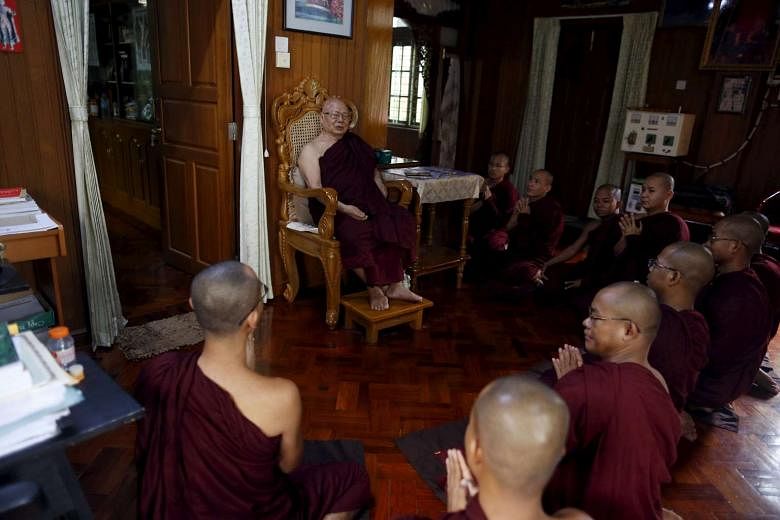YANGON • Swathed in crimson robes, 77-year-old Ashin Tilawkar Biwonsa shuffles through a crowded conference room with the help of an aide, his supporters standing in respect as he takes a seat under a portrait of his own image.
It is from here, at an unremarkable roadside monastery just outside Yangon, that the abbot is propelling the radical Buddhist group he co-founded into the mainstream of Myanmar's politics.
Four Bills drafted by his Committee for the Protection of Race and Religion, better known as Ma Ba Tha, have been passed by Parliament and signed into law. Critics say the new laws effectively legalise discrimination against women and the country's minority Muslims.
Now Ma Ba Tha is ratcheting up its public image ahead of elections in November, the first free vote in Myanmar in the last 25 years.
"There might be some people, especially Muslims, who are working on weakening Buddhism, so we need strong people for our religion," Ashin Tilawkar Biwonsa said.
Ma Ba Tha has shown no signs of contesting elections itself but says it will "remind" the public of candidates who opposed its four laws. These include Nobel peace laureate Aung San Suu Kyi and her opposition National League for Democracy (NLD), which is going head to head with conservatives and military figures in the polls.
Established two years ago, Ma Ba Tha sprang from the "969" movement, a collection of monks linked to violence against the country's Muslim minority in 2012 and 2013. Senior Ma Ba Tha officials said 969 had raised awareness about threats to Buddhism from a burgeoning Muslim population, but was disorganised and lacked leadership.
Now, a growing number of professionals are offering their expertise, to help shape Ma Ba Tha into a slick organisation with popular support and real political clout.
A team of Ma Ba Tha-linked lawyers drafted the protection of race and religion Bills, the last of which was signed by President Thein Sein on Monday.
In a sign of its growing influence, foreign diplomats regularly visit the group's monastery headquarters.
One was United States Ambassador Derek Mitchell, who went there twice in May to discuss "the need for increased interfaith dialogue" and "the importance of keeping religion out of politics", according to the US embassy in Yangon.
Myanmar's revered and influential monks led many pro-democracy protests during nearly half a century of military rule in the Buddhist-majority nation. But after a reformist government took power in 2011, some outspoken monks claimed Islam was eclipsing Buddhism and weakening the country.
Ashin Tilawkar Biwonsa says Ma Ba Tha has 250 offices nationwide. It has a deal with Myanmar's satellite television, SkyNet, to broadcast its sermons, bolstering a campaign that includes a bi-monthly magazine with a circulation of 50,000.
In contrast to long-delayed legislation on banking, mining and property, the Ma Ba Tha-backed "race and religion" Bills moved swiftly through Parliament. One Bill requires some women to wait at least three years between pregnancies. Another requires a Buddhist woman to seek official permission before marrying a non-Buddhist man.
This will stop Muslim men "torturing and forcing (Buddhist women) to change religion", Ashin Tilawkar Biwonsa said.
Ms Suu Kyi and her NLD opposed the laws. But government officials and politicians rarely criticise Ma Ba Tha, because they either sympathise with the group's views or fear upsetting its many supporters.
Any plans to sway voters would be "violating the law", said NLD spokesman Nyan Win, adding: "It's the government's responsibility to control and stop them."
-REUTERS

